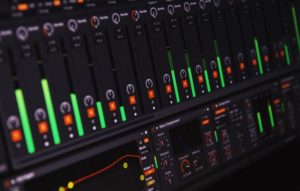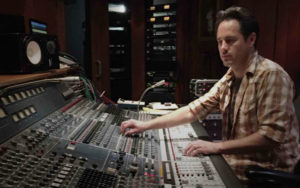
If you’re new to the music industry and looking to begin the process of recording an album, you’ve probably come across the terms mixing and mastering. However, you may find yourself questioning the difference between the two.
I don’t know the difference between mixing and mastering and at this point I’m too afraid to ask
— Blast Beats & Bentleys (@Necrotocism) June 7, 2019
There’s a lot of misinformation out there and those claiming to be mixing or mastering engineers who may not fully understand the terminology themselves. Both processes are integral to music production, but it’s important to understand what each stage entails.
This guide aims to clear some of the myths and confusion when it comes to the real differences of mixing vs mastering.
Mixing vs Mastering Video
Before we get into the guide, check out this awesome video from Graham Cochrane with The Recording Revolution. In it he discusses the difference of mixing vs mastering and also dispels some common myths around the subject.
If you liked that video, keep reading for even more tips, thoughts and advice on the biggest differences between these two crafts.
1. Multi-Track Mixing vs Stereo Mastering

A major difference of mixing vs mastering is that the mixing engineer will deal with a multi-track session (as pictured), while the mastering engineer will deal with a stereo mix.
The mixing engineer begins with a multi-track session that contains all the musical elements of a song. There’s no limit to the number of tracks they may be dealing with and it’s their job to combine them all into one cohesive stereo “mix”.
Once they’re finished, they pass their stereo mix file along to the mastering engineer to do his part. This is perhaps the most obvious difference between mixing and mastering.
The mixing engineer has a lot more control over every individual instrument and it’s their job to make sure that each element is heard by the listener. On the other hand, the mastering engineer is limited to tweaking the sound and tone of the overall mix. We’re going to talk a little bit more about what this means in the next few points.
2. Creating a Cohesive Listening Experience
In the sense of an entire album or EP, the mastering engineer is responsible for bringing all the tracks together into a cohesive listening experience.

It’s not unusual for various tracks on an album to be mixed by several different engineers. Even if they should be mixed by a single engineer, they’re often still mixed over a long period of time and the approach taken may change from song to song.
Furthermore, the mixing engineer rarely works through an album in the order it will be listened to. Because of this, they usually won’t be making changes based on the entire body of work as a whole.
This is where a mastering engineer proves to be an invaluable asset to a large collection of songs. It’s their job to listen through the album and figure out how to make everything flow properly from one song into the next.
The result is a much smoother listening experience, where every song sounds like it’s part of the same project.
3. Initial Vision vs Finishing Touches

The mixing engineer has a lot more control over the initial vision of a track’s sound.
As already mentioned, the mixing engineer combines every musical aspect of the song. So, they are responsible for the initial vision of how the song sounds. It’s their job to work with bands, accommodating their artistic ideas and making broad strokes that give character to a song.
Conversely, the mastering engineer usually takes the mix and adds the finishing touches. They make minor adjustments, fixing any problems that the mixing engineer may have missed. The changes are small but they go a long way in giving a track a professional and polished sound.
4. Art vs Science
There is no doubt artistic and scientific elements to both mixing and mastering. However, a mixing engineer often has more artistic control, while the mastering engineer must take a scientific approach.

The mixing engineer shapes the tone of each individual element and deals with effects like reverbs and delays. Because of this, there’s plenty of room to be creative and set the overall mood of the recording.
The mastering engineer may have some creative aspects to his approach but it’s not the primary purpose of his job.
Instead they’re listening with a careful ear for things like frequency build ups, whether or not the high and low end are balanced properly or how well the mix will translate onto smaller speakers. So, the mastering engineer makes adjustments with a much more analytical mindset.
5. Mixing Room vs Mastering Room
Though not always the case, there can be many differences between the environments that mixing and mastering engineers work in. This is especially true on a professional level.
A mixing engineer will implement sound treatment and professional grade monitors to be sure they are making changes in an accurate environment. Yet, the quality of mixing rooms can be all over the map, with some being far more treated than others.
However, a professional mastering engineer will have made a major investment in sound treatment that is beyond that of the average mixing engineer. Their monitors are also of the highest grade to assure the most accurate representation of the entire frequency spectrum.
Check out the video below of acclaimed mastering engineer Jonathan Wyner, discussing the importance of a quality mastering room.
All of this allows the mastering engineer to make calculated changes to a track with confidence.
Although this is still an important factor to the mixing engineer, it is a little more forgiving, largely because the mastering engineer can catch anything they happen to miss.
6. Not Every Mixing Engineer Can Master

When it comes to mixing vs mastering, the engineer is more important than the tools and techniques of the trade.
This is more of a matter of opinion, but many believe the art of mastering comes down to the engineer.
A mixing engineer will have a strong knowledge and experience in mixing music and shaping sound. However, many professional mastering engineers are those who have spent decades working in the industry and overtime acquired a highly trained set of ears.
A mastering engineer will often know what a song needs after the first couple listens. These changes are usually very minor and quick to make. However, it took them years of dedicated listening to be able to pick up on these problems right away.
This is why many mastering engineers are those who have spent a good portion of their career mixing music, slowly acquiring a highly tuned set of ears.
Mixing vs Mastering In a Nutshell
Many people don’t initially realize just how different the roles of the mixing and mastering engineer can be. While the mixing engineer deals with a multi-track session and combines all the musical elements into a stereo mix, the mastering engineer takes this stereo file an ads finishing touches across the whole mix.
Because of this, mixing engineers have a lot of creative control, while the mastering engineer takes a more scientific approach. It’s also the mastering engineer’s responsibility to take all of a project’s songs and combine them into a cohesive album.
Both work environments and tools of the trade reflect these differences. Most of all however, it comes down to experience. The mastering engineer has well trained ears that can pick up on issues the average listener may not realize.
Learn something new everyday. Mixing vs Mastering.
— TOMMY C (@IBUTOMMY) February 10, 2011
To learn more about the role of a mastering engineer, check out our guide on 7 Reasons Mastering Music is Important. We also have a wealth of articles on mixing available including these 17 Integral Mixing Tips.
If you’re interested in delving a little deeper into the topic of mixing vs mastering, check out this awesome video of well known producer and mixing engineer Sylvia Massy, sitting down with mastering engineer Jonathan Wyner.
If you found the tips in this guide useful, be sure to share it with your friends. Also, check out the rest of the Sundown Sessions Blog for more advice on home recording, songwriting and music business.
Ready To Get Your Music Mixed and Mastered?

Our mixing and mastering engineers are ready to take your recordings to the next level.
Sundown Sessions Studios offers some of the world’s top mixing and mastering engineers, available to work on your music at an affordable price.
Our team of mixing and mastering engineers have numerous Grammys, JUNOs and radio hits to their name. If you’re ready to take your music to the next level, head over to our mixing and mastering page to learn more.
